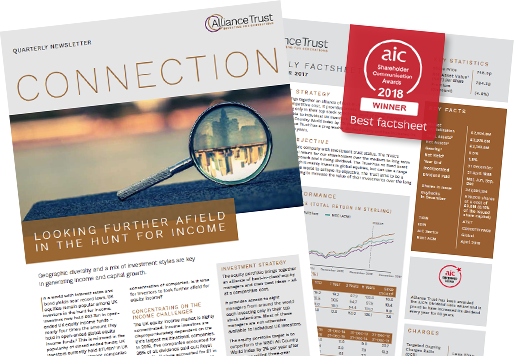A transformation at born-again Alliance Trust
For more than a decade, the giant Alliance Trust seemed locked in an irreversible downward spiral. Poor performance, management upheavals, a yawning discount to net assets and constant attack from activist investors dogged its reputation.
When banks were deemed too big to fail, the £2.6 billion 130-year-old Dundee trust seemed too big to succeed. It struggled to find a focus. New strategies came and went. As its shares languished, it lost its position as the UK’S largest investment trust, overtaken by barnstorming rival Scottish Mortgage riding the wave of super-powered tech stocks such as Facebook, Amazon, Netflix and Google.
Remedies at Alliance ranged from drastic surgery to break-up. But a transformed Alliance has risen from this dark and turbulent period. Under Willis Towers Watson, this dowdy dowager of Dundee has emerged as a forward-looking multimanager trust, with a panel of nine external fund managers investing in their best ideas. And boardroom stability was helped in no small measure by the appointment of Lord Smith of Kelvin as chairman. He took over from Karin Forseke in January 2016, just as US activist investor Elliott Advisers was pressing for a change of governance after years of uncertainty and unrest. Now, after four years of overseeing a radical restructuring and simplification at Alliance and returning the trust to the front line of the sector, he is stepping down.
Performance has been transformed. Cumulative gain over the three months to 6 September is 5.6 per cent, ahead of an average 2.8 per cent gain for the global trust sector. Over one year it has gained 7.2 per cent against 3.1 per cent for the sector. And over five years the cumulative performance sports a gain of 95.9 per cent against a sector average of 83.3 per cent.
Alliance shares have risen from below 300p ten years ago to 801p today. The yield is modest at 1.72 per cent but the discount at which the shares stand to net assets has tumbled from around 15 per cent ten years ago to 5.25 per cent.
Among the changes wrought by Watson and overseen by Smith are:
- The in-house “sustainable” fund management arm Alliance Trust Investments sold to Liontrust for £30m
- Adoptionof amulti-managerstrategy with eight external fund managers each given a portion of the portfolio to invest in their best ideas
- Fund manager Hermes hired to help boost its engagement with companies on environmental, social and governance issues
- The trust’s investment platform, Alliance Trust Savings, sold to Interactive Investor for £40m and mineral rights and private equity investments offloaded
- Activist Elliott Advisers’ 19.75 per cent stake bought back for £620m, ending seven years of agitation and tension and two years of siege that cost Alliance chief executive Katherine Garrett-cox her job
- Alabama’s Vulcan Value Partners added to its multi-manager team
- Finally, in July, Smith cut boardroom pay – a move that saw his cut from £120,000 to £80,000 alongside fee reductions for other directors on the six-strong board.
But it is the multi-manager approach that has worked to lift performance. I was sceptical when this was unveiled, fearing lack of focus and a conflicting set of investment styles and approaches that would depress performance towards the average. But it has got off to an impressive start.
The portfolio is well diversified geographically – 45 per cent in North America, 23.5 per cent in Europe, 12.3 per cent in the UK and 15.4 per cent in international equities. Biggest holdings are Alphabet, Microsoft, HDFC Bank, Unilever and Abbott Laboratories.
Smith, former head of engineering group Weir, former governor of the BBC and chairman of Scottish and Southern Energy and the Green Investment Bank, has recently been appointed chairman of Scottish Enterprise. He will be succeeded as Alliance chairman by his deputy Gregor Stewart, who has spent 24 years at a partner at Ernst & Young.
Alliance can now fairly claim to be a first stop shop for investors looking for a core anchor holding, a diversified portfolio, a wide-ranging teamofexpertstockpickers, low charges and fees – and a striking improvement in investment performance.
For the past few years, Scottish Mortgage has been regarded as the top-performing tech trust with stellar holdings in the digital and IT sector. This £8.5bn giant has generated returns of 132 per cent over five years and 558 per cent over ten years.
Outstanding performance, certainly – but top of the class? I am grateful to Ian Cowie of Investment Trust Insider for pointing out that Polar Capital Trust, co-managed by Fatima Lu and Ben Rogoff, has delivered total returns of 184 per cent over the last five years and 604 per cent over the last decade.
And rival Allianz Technology Trust, managed by Water Price, has fared even better, gaining 215 per cent and 670 per cent over five and ten years respectively. Performance here has been helped by venturing further than its rivals into smaller companies. So, even in a specialist sector, it seems, investors should consider spreading their bets!






